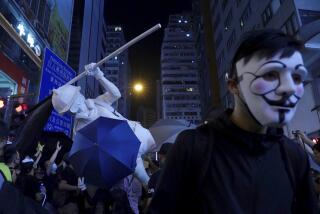Casino-Rich Enclave Fears for Future After 1999 Takeover : China’s Democracy Crackdown Dims Hope in Macao
MACAO — The bloody crackdown on dissent in China has made many residents of this casino-rich Portuguese enclave increasingly reluctant to bet on a future here with the Communist Chinese takeover a decade away.
Community leaders say the suppression of the May-June democracy movement in Beijing has increased fears of what might be in store for Macao, a reaction also experienced in the nearby British colony of Hong Kong, which reverts to China in 1997.
“We are exactly in the same situation as is Hong Kong,” said Legislative Assembly member Alexandre Ho. “The confidence crisis has worsened,”
Portugal agreed in 1987 to return this six square-mile enclave of about half a million people, almost 97% of whom are ethnic Chinese, to China in 1999. Beijing promised Macao--as it did with Hong Kong--that it could maintain its capitalist system for 50 years and enjoy a high degree of autonomy.
Macao residents joined their Hong Kong brethren in enthusiastically supporting the student-led democracy movement in China.
On June 4, when reports on the Chinese military suppression of the movement in Beijing began to reach Macao, an estimated one-fourth of the territory’s population streamed into the narrow streets to denounce China’s leaders.
In both colonies, the crackdown led to plunging property values and increased interest in emigration.
“We know many of our friends are preparing to leave,” said legislator Ho. Press reports in Lisbon say wealthy Macao residents are depositing more personal wealth in Portugal.
But the trauma in Macao appears not as great as it is in Hong Kong, in part because many people in Macao can find new homes before 1999 with their Portuguese passports.
Although the more than 3 million Hong Kong residents are eligible for British passports, they have no right to settle in Britain. They have bitterly denounced Prime Minister Margaret Thatcher’s government in London for refusing to change that policy after the Chinese crackdown.
But the 100,000 or so Macao residents with Portuguese passports not only have full rights to live in Portugal but expect to be able to settle almost anywhere in Western Europe, including Britain, after the European Economic Community removes trade and other barriers by the end of 1992.
Ho believes that perhaps a quarter of Portuguese passport holders in Macao will leave. Many of those who stay will do so because they have “no language skills, no work skills and no capital to start a new life,” he said.
The assemblyman said he has yet to decide whether he will use his Portuguese passport to emigrate but acknowledges that the crackdown in China “makes me less comfortable.”
Another man yet to make a final decision is Stanley Ho, who has made a fortune leading the monopoly that runs Macao’s six gambling casinos.
He said he plans to watch carefully what happens to Hong Kong after China takes over in 1997.
“If it doesn’t work . . . you may see me in San Francisco or Canada or Europe,” he said. “If it’s going to be difficult, inconvenient, I’ll have to say, ‘Cheerio.’ ”
Such a breezy response is not possible for the 400,000 Macao residents without Portuguese passports, many of whom are recent immigrants from China and do not have the money, education or family connections to obtain residency rights in other countries.
Their chances to emigrate appear dim and the Portuguese government is not considering helping them leave.
Settled in 1557 as the first European foothold in Asia, Macao once was a major colonial trading center but long ago was surpassed by Hong Kong, just 40 miles to the northeast.
Politically, Beijing’s influence in Macao has grown in recent decades. In 1967 the territory agreed to deport to China anti-communist troublemakers. Most local business and civic leaders support the Chinese government, while the media, except for a few weeks during the democracy movement, generally toe the official Beijing line.
Economically, the casinos and light industry remain the mainstay.
“I’ve served more than 10 governors,” said Stanley Ho, who has the gambling monopoly through 2001. “Each and every one of them tried to rely less on gambling. I think none of them have succeeded. The gambling revenue in Macao is very important.”
He added that he has received personal assurances from China that gambling will be allowed after 1999.
In an effort to help the territory’s fortunes, Ho has joined forces with the Macao government and China to build an offshore international airport. The $450-million first phase is scheduled for completion in 1993. Other major construction projects include a deep-water harbor.
While some people say the airport will not attract enough business to be viable, others say it is essential to attract foreign investment and bring more tourists to the territory.
More to Read
Sign up for Essential California
The most important California stories and recommendations in your inbox every morning.
You may occasionally receive promotional content from the Los Angeles Times.










